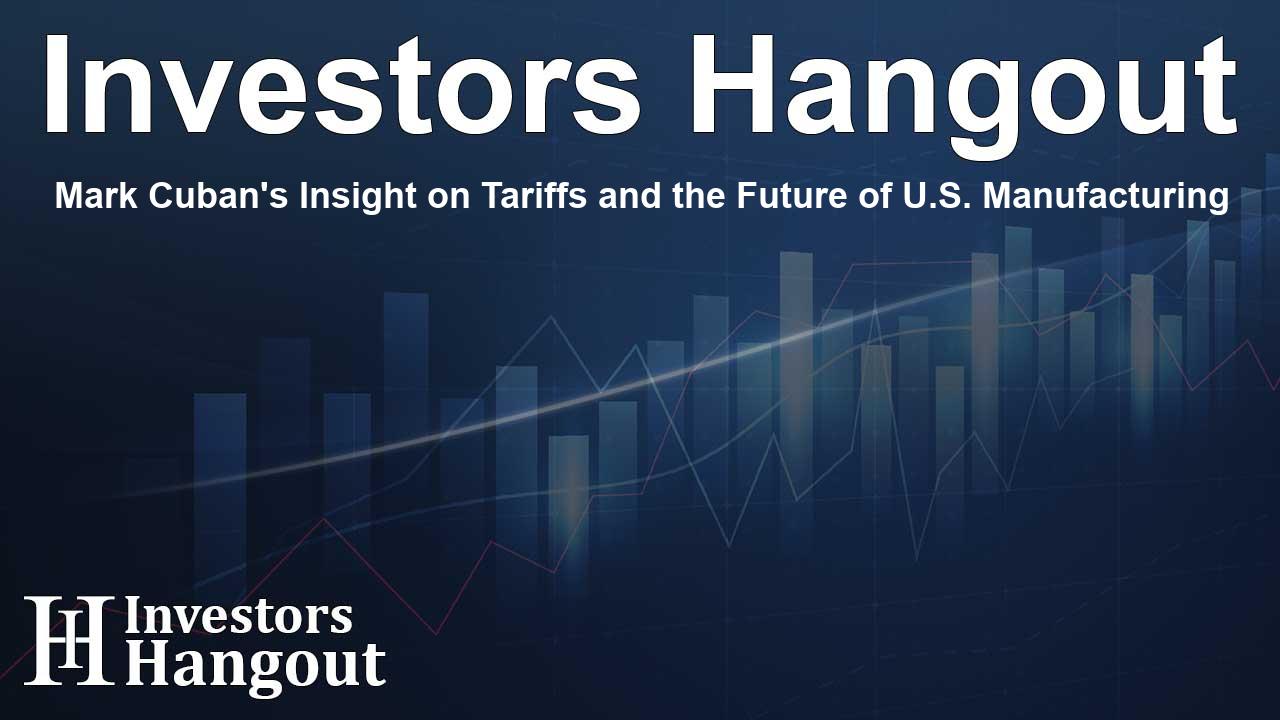Mark Cuban's Insight on Tariffs and the Future of U.S. Manufacturing

Mark Cuban's Critique of Tariffs
Billionaire entrepreneur Mark Cuban recently expressed his concerns about former President Donald Trump’s proposed tariffs. Instead of supporting blanket tariffs, Cuban advocates for strategic approaches to enhance U.S. manufacturing. His argument is rooted in a deep understanding of both consumer behavior and the realities businesses face in the manufacturing landscape.
The Debate with Matthew Boyle
The renowned "Shark Tank" star and owner of the Dallas Mavericks engaged in a lively discussion with Matthew Boyle, the Washington Bureau Chief at Breitbart News Network. Cuban, known for his candid opinions, elaborated on the implications of Trump's tariffs in an economy that heavily relies on global trade and local production.
Complexities Behind Tariff Proposals
Cuban boldly stated, “Across the board tariffs are an inflationary tax proposed by someone who doesn’t understand how tariffs work.” This statement underlines the need for a more nuanced view of trade policies that considers both consumer choices and the constraints businesses face.
Two Key Issues with Tariffs
During the discussion, Cuban highlighted two fundamental issues often overlooked in tariff discussions. First, he pointed out that most American consumers are not willing to pay a premium for domestically produced goods solely out of patriotic sentiment. This suggests a need for a shift in consumer mentality toward supporting local manufacturing.
Understanding Business Limitations
The second point Cuban made revolves around the economic constraints that many businesses encounter. He emphasized that corporations do have a strong desire to produce goods domestically; however, they often find themselves unable to do so profitably. If manufacturing costs could be lowered, they would already be shifting their production back to the United States.
The Role of Robotics in Manufacturing
To address these challenges, Cuban proposed the integration of robotics into the manufacturing process. He believes that advancements in automation could not only decrease production costs but also lead to lower prices for consumers, thereby potentially revitalizing American manufacturing.
Cuban's Remarks on Vice President Harris
In contrasting Trump's understanding of manufacturing with that of Vice President Kamala Harris, Cuban noted, “That’s what Harris understands that Trump doesn’t.” He believes that incentivizing companies to adopt new technologies, similar to initiatives like the Chip Act, can facilitate the return of manufacturing jobs from abroad.
Impacts of High Tariffs
The discussion also touched on the potential repercussions of high tariffs. Cuban warned that while tariffs may appear beneficial in promoting local manufacturing, they could inadvertently harm small businesses. He pointed out that a significant number of manufacturers in the U.S. are small enterprises, with approximately 75 percent employing fewer than 20 people. If tariffs are set too high, those small manufacturers might find themselves at a disadvantage compared to larger, foreign competitors.
Social Media and Public Perception
This engaging debate was further amplified by Cuban’s recent social media activity, where he humorously shared a picture from the Oval Office with Trump, indicating their past interactions. His playful caption suggested a friendly relationship, yet he quickly affirmed his support for Harris's campaign, clarifying he is not backing Trump in the upcoming elections.
Potential Economic Disruptions
Experts warn that Trump’s plans to implement tariffs could lead to economic disturbances, including a decline in U.S. currency value. Strategic frameworks and well-informed policies are vital to avoid such pitfalls.
Harris’s Defense of Strategic Tariffs
Vice President Harris has also voiced her concerns regarding Trump’s tariff strategies, calling them reckless. She stresses the importance of deliberation before imposing tariffs, as the repercussions could negatively affect many American households.
Frequently Asked Questions
What is Mark Cuban's stance on Trump's tariffs?
Mark Cuban criticizes Trump's proposed tariffs as an inflationary tax that does not understand the complexities of global trade.
Why does Cuban believe robotics could help manufacturing?
Cuban sees robotics as a way to reduce manufacturing costs, allowing for lower consumer prices and making domestic production more viable.
How do tariffs impact small manufacturers in the U.S.?
High tariffs could disadvantage small manufacturers, which often have fewer resources compared to large foreign competitors, threatening their survival.
What did Cuban say about consumer behavior?
Cuban indicated that most American consumers are unlikely to pay more for American-made products, highlighting the need for a change in purchasing attitudes.
What does Cuban compare Trump and Harris on?
Cuban contrasts Trump’s lack of understanding regarding modern manufacturing with Harris’s recognition of the need for technology incentives to enhance U.S. manufacturing competitiveness.
About The Author
Contact Kelly Martin privately here. Or send an email with ATTN: Kelly Martin as the subject to contact@investorshangout.com.
About Investors Hangout
Investors Hangout is a leading online stock forum for financial discussion and learning, offering a wide range of free tools and resources. It draws in traders of all levels, who exchange market knowledge, investigate trading tactics, and keep an eye on industry developments in real time. Featuring financial articles, stock message boards, quotes, charts, company profiles, and live news updates. Through cooperative learning and a wealth of informational resources, it helps users from novices creating their first portfolios to experts honing their techniques. Join Investors Hangout today: https://investorshangout.com/
The content of this article is based on factual, publicly available information and does not represent legal, financial, or investment advice. Investors Hangout does not offer financial advice, and the author is not a licensed financial advisor. Consult a qualified advisor before making any financial or investment decisions based on this article. This article should not be considered advice to purchase, sell, or hold any securities or other investments. If any of the material provided here is inaccurate, please contact us for corrections.
